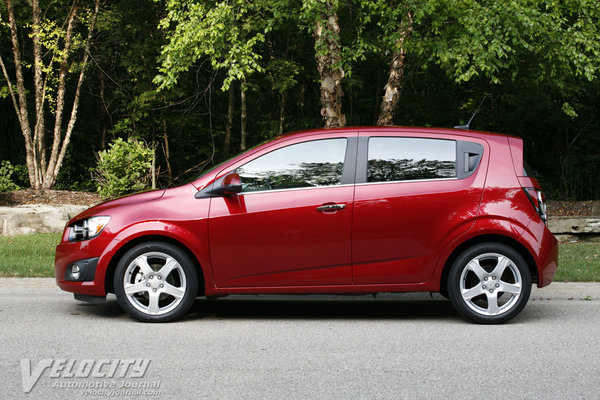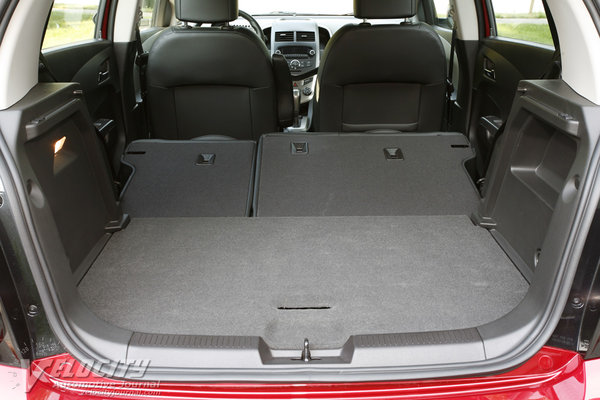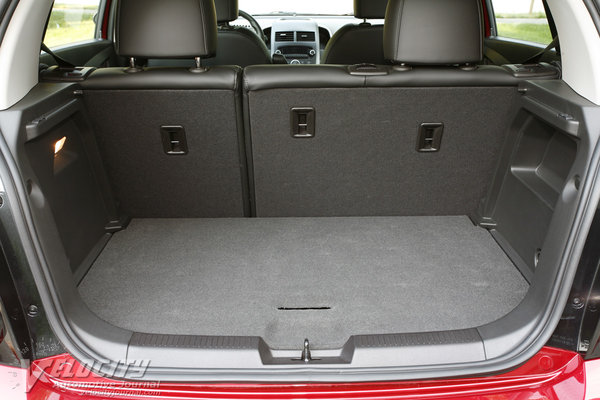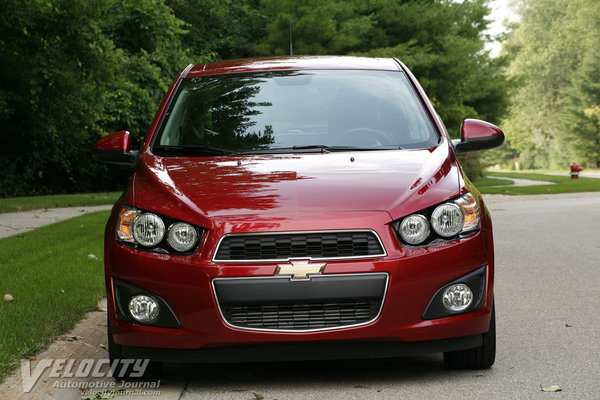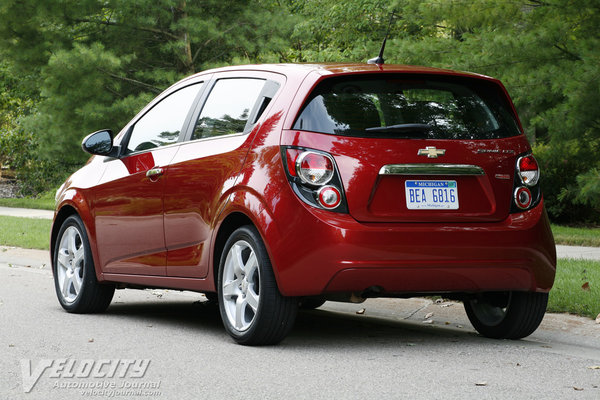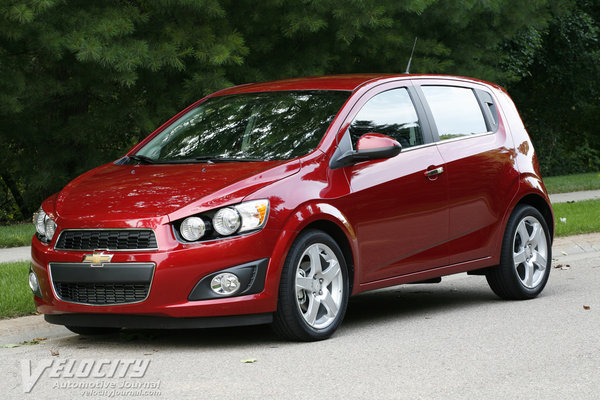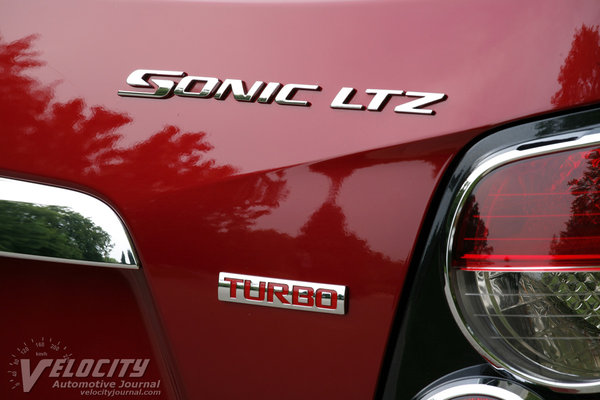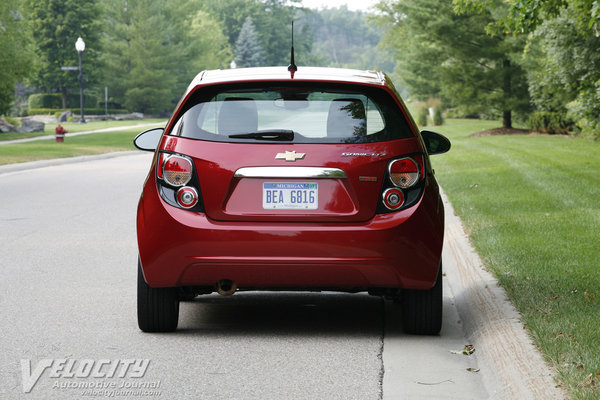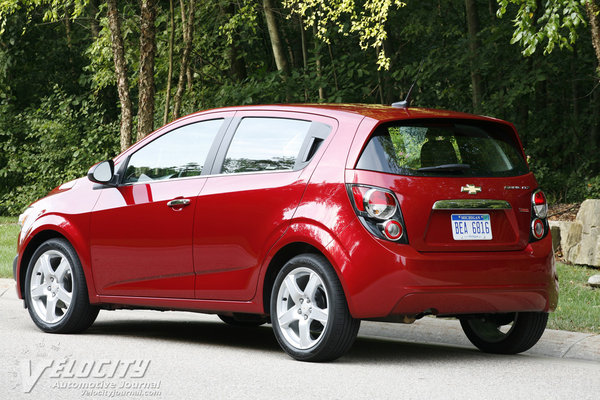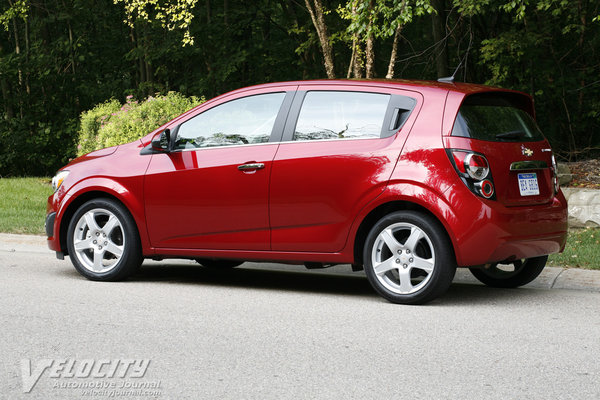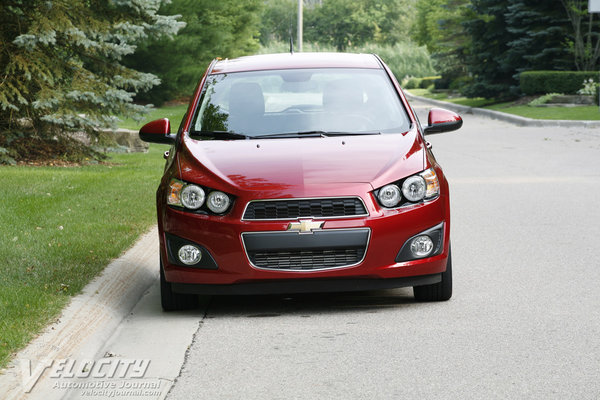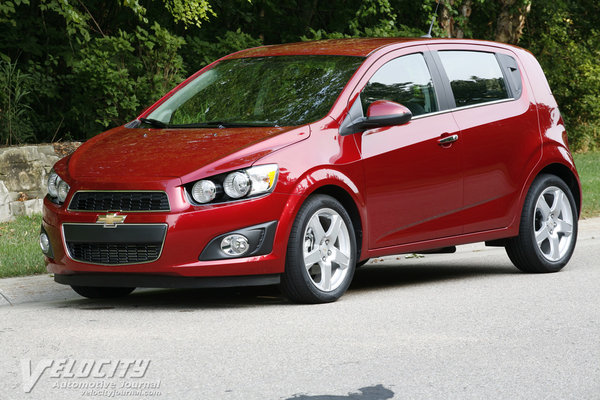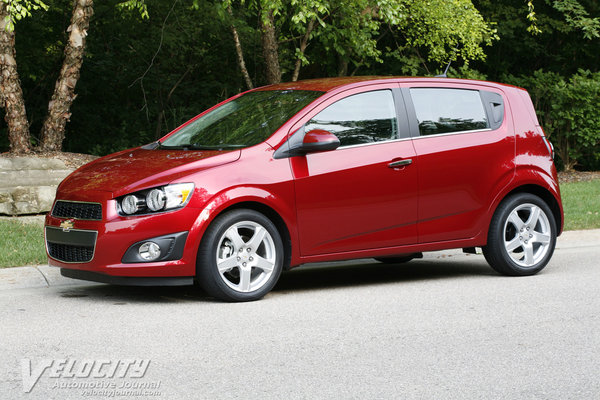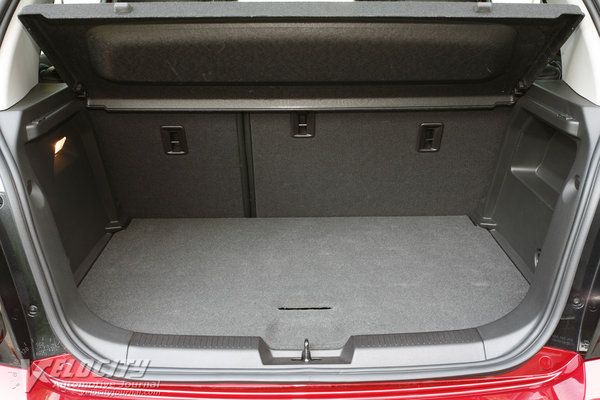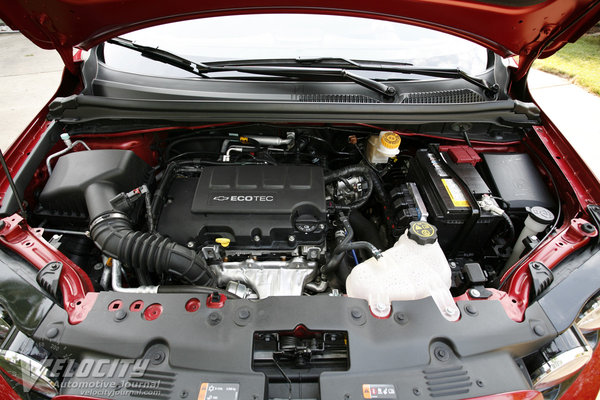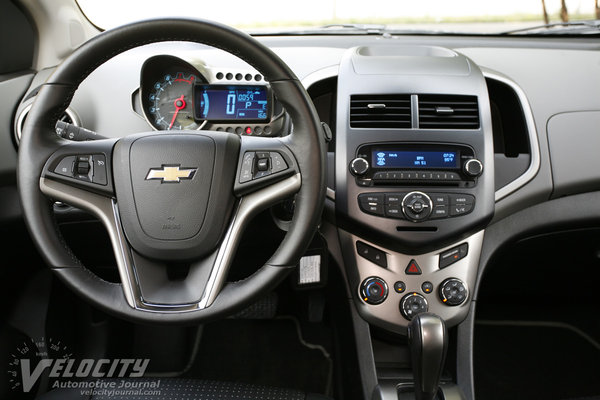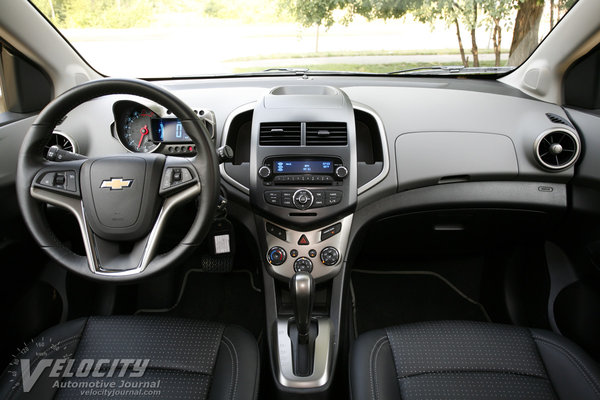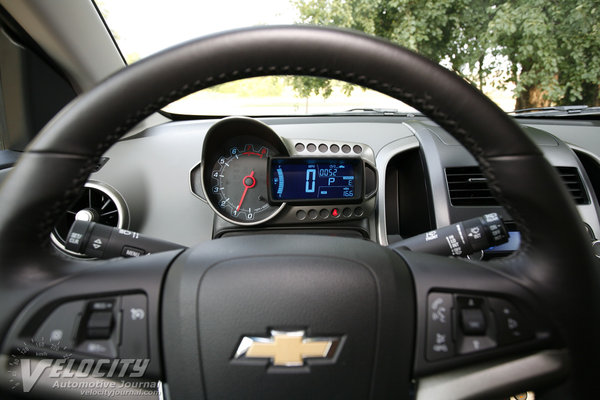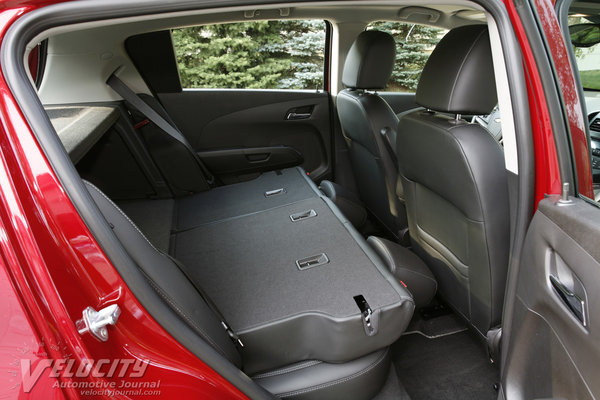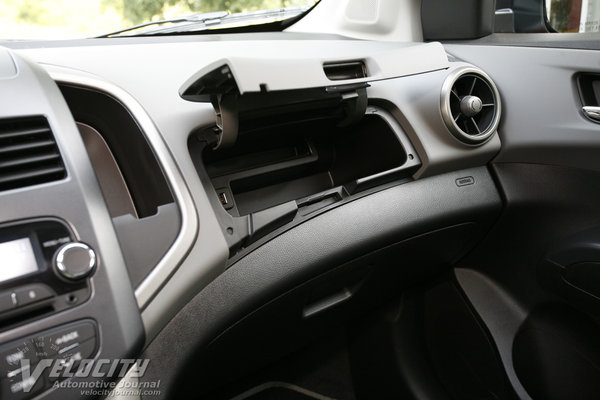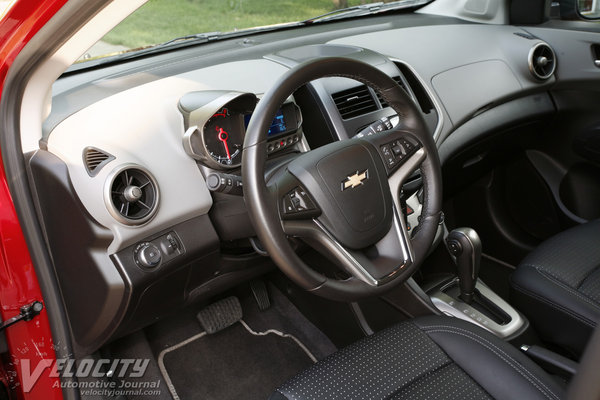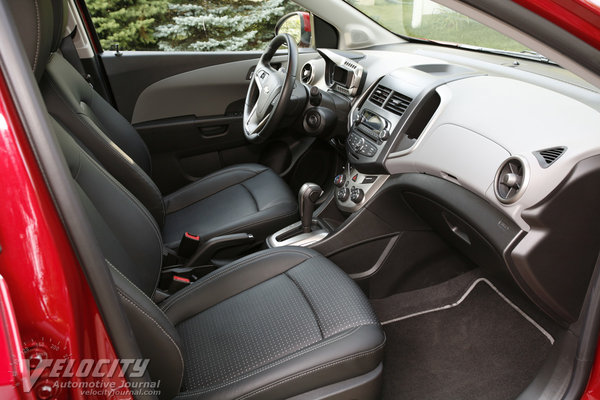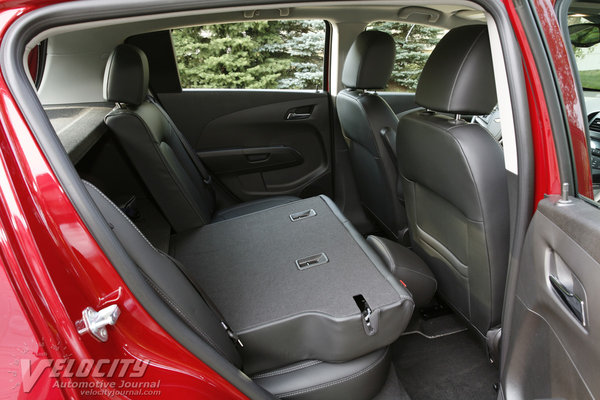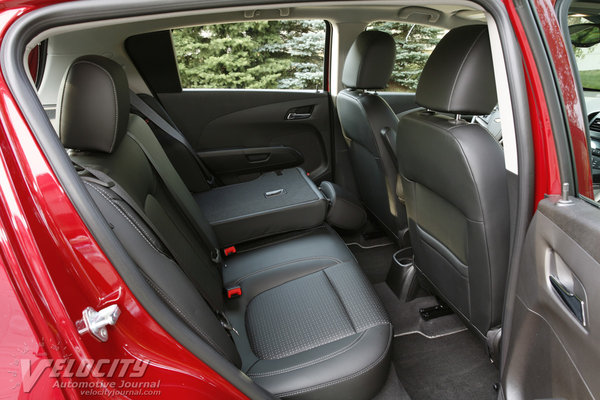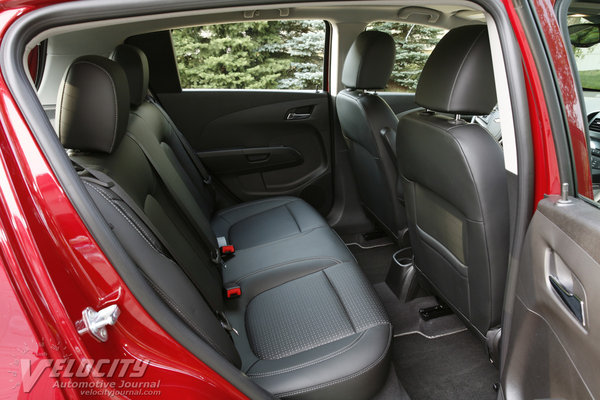2012 Chevrolet Sonic LTZ
08/14/2012
Shahed Hussain
After years of neglect, Chevrolet is revamping its small car lineup. After the launch of the popular Cruze, Chevy added the subcompact Sonic, which replaced the Korean-made Aveo. While the Aveo was never a serious alternative to the Ford Fiesta or Honda Fit, the Sonic gives up nothing to its competition.
Chevrolet positions the Sonic sedan as the entry model, while the 5-door hatchback is slightly more expensive. Pricing for the sedan ranges from $13,865 (LS Manual) to $17,925 (LTZ Automatic). The hatchback starts at $14,765 and rises to $18,625 for the same trim levels. We tested a 2012 Sonic LTZ Hatchback optioned with the 1.4L turbo ($700), and the extra cost Crystal Red Metallic Tintcoat ($325). The total MSRP including the $795 destination charge was $20,445. Value-conscious customers should consider the Sonic LT sedan ($15,860), which offers nearly the same equipment and options at the LTZ for significantly less money.
Chevrolet's concerted effort to upgrade interior design and materials shows in the Sonic. The dash, console, and door panels are hard plastic, but materials and build quality are better than expected. The leather-covered steering wheel in the LTZ is a welcome surprise. Chrome accents and a titanium-colored center console add some contrast to the predominantly dark gray interior.
The Sonic's leather-wrapped steering wheel, which tilts and telescopes, has integrated controls for cruise, telephone, and audio. Gauges consist of an 8,000 RPM analog tachometer coupled to a blue backlit digital display for the speedometer, fuel gauge and trip computer. However, coolant temperature is missing, an increasing common omission among entry level cars. The audio system uses simple knobs and buttons with a large blue display. Climate controls consist of three rotary knobs and a few buttons. The A/C proved to be superbly effective on 100+ deg. F summer days without sapping excessive power from the engine.
Instead of the cloth seats in the Sonic LS and LT, the LTZ gets perforated leatherette upholstery. The driver's seat offers manual controls for reach, rake, and height. Overall comfort is adequate, but the front seats sacrifice some lateral support for easier entry and exit. A convenient flip-down armrest on the driver's seat is appreciated, but the unpadded door armrest was simply unusable. Rear seat accommodations are spacious, with decent overall comfort and legroom. The Sonic's boxy roofline provides adequate headroom for 6-ft. tall occupants.
The Sonic provide ample storage space throughout the cabin. Small bins on either side of the dash vents can hold mobile phones or other small objects. The main glove box is supplemented by a smaller upper compartment with USB and auxiliary audio inputs for an MP3 player. The center console holds three cupholders. With the rear seats up, the 19 cu. ft. storage space is limited to small suitcases and duffle bags. Even though the load floor isn't completely flat, cargo capacity expands to 47.7 cu. ft. with the rear seats folded. Under the cargo area, above the temporary spare tire, is a shallow compartment for additional hidden storage.
The Sonic's standard powerplant is a 138-bhp 1.8L inline-4 mated to a 5-speed manual or 6-speed automatic. Sonic LT and LTZ models can be equipped with the optional turbocharged 1.4L inline-4 rated for 138-bhp @ 6300 RPM and 125 lb.-ft. @ 3800 RPM. Transmission choices consist of a 6-speed manual or the optional 6-speed automatic. The boosted 1.4L transforms the Sonic into a genuinely quick hatchback, even with the automatic gearbox. Spooling up quickly, the turbo adds impressive midrange response, especially appreciated when passing other cars on the highway. Chevrolet claims the Sonic runs the 0-60 MPH sprint in less than 8.2 seconds. As an added bonus, the turbo runs on regular unleaded gas. The EPA estimates are 27/37 MPG (city/hwy.) for the turbo mated to the automatic gearbox. We averaged between 30-34 MPG in mostly highway driving, so the EPA numbers seem reasonable. The standard 6-speed manual is considerably more fuel-efficient on the highway, achieving an impressive 40 MPG rating.
The Hydra-Matic 6T40 is a smooth-shifting unit that downshifts readily on demand. A shifter-mounted button allows manual gearchanges when desired, but we rarely found occasions to second-guess the transmission's electronic algorithms. Opting for the automatic adds a significant $1,260 to the Sonic's sticker price. Although we have not sampled the manual gearbox, the lower cost and superior fuel economy are worth considering.
Most subcompacts share a common suspension layout, and the Sonic conforms to the standard with front MacPherson struts and a stabilizer bar. At the rear is a torsion beam semi-independent axle with coil springs and gas-charged dampers. Steering is electronically-assisted with 2.7 turns lock-to-lock. Brakes consist of vented 10.8-in. diameter vented front discs and 9.0-in. diameter rear drums with ABS and stability control standard. Alloy wheels are standard on all Sonic models. The LTZ gets 17-inch wheels with P205/50R17 Hankook Optimo H428 tires.
Considering the Sonic's relatively light curb weight of 2,776 lbs, Chevrolet did a commendable job optimizing ride comfort. While large potholes will upset the chassis, the Sonic handles most road imperfections better than expected. Occasionally, the rear axle will bounce off some bumps, requiring quick steering correction, but the Sonic fares no worse than other subcompact cars with a torsion beam axle. Crosswinds tend to blow this boxy hatchback around on the highway, a consequence of its tall profile and light weight. Despite accurate steering and decent road feel, the Sonic's handling is compromised by significant body roll, a consequence of its tall profile and relatively soft suspension tuning. The Hankook tires are unimpressive, requiring frequent steering corrections around curves and on the highway. The ABS could be easily invoked in the dry, partly due to significant suspension dive under hard braking. Replacing the Hankooks with better tires would certainly enhance overall handling, but low cost usually rules in this segment. Enthusiasts on a budget should consider waiting for the sporty Sonic RS, due to join the lineup in late 2012.
As high fuel prices have become the norm, Chevrolet has expanded its small car portfolio in response to the resurgent popularity of small cars. The Sonic combines excellent fuel economy with surprising performance and comfort. Although the LTZ may be a bit too expensive for this price-conscious segment, the Sonic LT is likely the best value in the model range.

